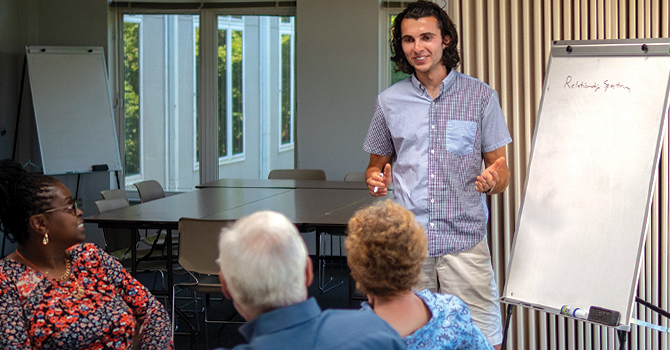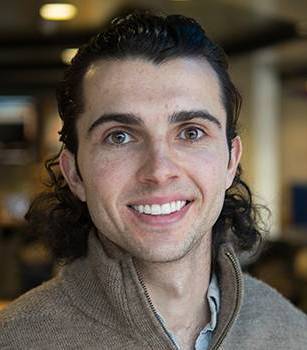Engaging the Communities We Inhabit

Spencer Walz
Bachelor's Student, Vivian Craig Hagberg and John Hagberg, Jr. Scholarship Fund
To paraphrase Dr. Amit Sood in The Mayo Clinic Guide to Stress-Free Living, the pursuit of compassion can make us happier than the pursuit of happiness. This insight has provided a framework with which I have been able to ground my passion for advocacy and social justice.
Seven years ago, I decided to give college the old "college try." Stressed and overwhelmed two years into my studies, I decided to put my undergraduate experience on hold and challenge my own perceptions of health and wellness. Six years of contemplation and exploration have passed since I made the decision to withdraw.
In moving through my own struggles, I grew too in my understanding of how best to help others. In 2012, I began volunteering with the National Alliance on Mental Illness (NAMI) in Washtenaw County, which provided me the space to question my own perceptions of public mental health and what I have to offer to the community. My experiences helped me decide to continue my undergraduate studies at the University of Michigan, and my understanding of public mental health continues to grow.
A hard truth for the mental health community is that there is still so much we do not know.
I had been active in the mental health community for the majority of my adolescence and young adulthood. I myself suffered the most from mental health challenges as a child and am grateful to have had a web of support woven around me from an early age. With this web came early detection, intervention, and ultimately recovery to the point that I was able to practice advocating for others.
From a young age I knew that I wanted to be a voice of change. In seventh grade, I had the opportunity to present in front of the Michigan state legislature at an event called "Kid Speak." I stepped up to the podium, inwardly fighting off an anxiety attack, and delivered a speech that challenged mental health parity laws at the time. Among other things, I discussed my concern that I would only be reimbursed for up to twenty visits with my therapist a year.
A hard truth for the mental health community, however, is that there is still so much we do not know. This is not to discredit efforts and growth within the field but rather to highlight the uncertainty felt throughout many of our public mental health systems.
The most important lesson I've learned through volunteer work is that healing exists on a continuum—in the major shifts in parity laws and in holding space for individuals to feel heard and seen.
With uncertainty comes the need to focus on belonging. Compassion means broadening my own circle of relationships and being willing to lean into the vulnerability of my own and others' suffering. Grounded in one-on-one interactions, my peers at NAMI and I try to create empathetic spaces for those living with mental health challenges: biweekly support groups for young adults, ten-week psychoeducational courses rooted in peer-to-peer interaction, and a story-sharing development platform that focuses on the healing properties of owning one's personal story. Our intense engagement with individuals and small groups regularly leads to insights and raw materials that we can apply more broadly.
The most important lesson I have learned through volunteer work is that healing exists on a continuum—in the major shifts in parity laws and in holding space for individuals to feel heard and seen. Public health work addresses the macro and the micro and relies on both to succeed.
Deep healing across all systems feels uncertain at times, but I do not need to travel far to find it. Whether I am a healing agent, a recipient of care, or both, compassion guides my work here in this place and my drive to move the fruits of that work well beyond.
- Interested in public health? Learn more here.
- Read about Spencer Walz’s path to public health.
- Learn more about Michigan Public Health’s undergraduate degrees.
- Support students like Spencer Walz.
About the Author
 Spencer Walz is pursuing a BS in Public Health Sciences and is a recipient of the
Vivian Craig Hagberg and John Hagberg Jr. Scholarship. Read more about his path to
public health at We Are Michigan Public Health.
Spencer Walz is pursuing a BS in Public Health Sciences and is a recipient of the
Vivian Craig Hagberg and John Hagberg Jr. Scholarship. Read more about his path to
public health at We Are Michigan Public Health.
